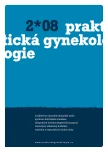-
Medical journals
- Career
General view of issues of post-natal depression from the point of view of a gynaecologist-obstetrician
Authors: M. Jedličková
Authors‘ workplace: Svitavská nemocnice, a. s.
Published in: Prakt Gyn 2008; 12(2): 86-90
Overview
Objective:
To bring attention of health experts to the importance and gravity of psychic disorders post partum, to encourage their psychoprophylactic approach and behaviour towards pregnant, parturient and post-partum women, and to make post-partum depression screening a standard component of exams performed in the doctor’s surgery and in the hospital ward.Type of study:
Theoretical and research questionnaire study.Patient group and method:
200 women on the 3rd to 12th day post-partum and 50 women after childbed fi lled out a questionnaire made of questions concerning general data such as age, training, as well as their current mental condition and the women’s knowledge of post-partum depression. The research took place in Svitavy city hospital and in Pardubice regional hospital and lasted from February 2006 to January 2007.Results:
We recorded a 100 % rate of questionnaire return thanks to effective communication with the women enrolled in the survey. The evaluation of the set of respondents was based on the screening questionnaire and general information showing their family background and current situation. The questionnaire survey showed that an average of 22 % of women (of which 12 % in Svitavy city hospital and 32 % in Pardubice regional hospital) needed further examination, preferably by a psychiatrist.Conclusion:
The study brings attention to alarming results with respect to the above condition which is very often neglected or considered normal in the context of post-partum endocrine changes. Post-partum depression may result in a change in the overall health status, in psychological disorders or even suicide resulting from failure to recognise symptoms rather than from failure to use the correct therapy.Key words:
post-partum depression – childbed – psychical defect – screening
Sources
1. Strunzová V. Terapie deprese, úzkostných poruch a nespavosti v graviditě a laktaci. Psychiat pro Praxi 2005; 1 : 26-30.
2. Pérez M. Akutní psychotická porucha v poporodním období versus myastenia gravis. Psyhiat pro Praxi 2002; 6 : 284-286.
3. Smolík P. Duševní a behaviorální poruchy. Praha: Maxdorf 1996.
4. (Burke et al., 1991)
5. Kosová J. Deprese s úzkostí a poruchami spánku. Psychiat pro Praxi 2006; 6 : 285-287.
6. Ansseau M, Frenckell R, Franck G. Biological markers of depression. Amsterdam: Excerpta Medica 1991.
7. Bolwig TG. Suicide and depression: new trends in research and prevention. Copenhagen: Munksgaard 1993.
8. Břicháček V. Edinburghská škála postnatální deprese: ověření v České republice. Praha: Iga MZ ČR 2000.
9. Cohen RM. Nejčastější psychické poruchy v klinické praxi. Praha: Portál 2002.
10. Čepický P. Psychologie ženy. Učební text pro střední zdravotnické školy, obor porodní asistentka. Praha: Čepický 1992 : 48.
11. Geisel E. Slzy po porodu. Praha: Grada Publishing 2004.
12. Goldmann P, Perušičová J, Hořejší J. Depresivní stavy: depresivní nemocný v nepsychiatrických ordinacích. Praha: Medical Tribune CZ 2005.
13. Honzák R. Deprese. Praha: Galén 1999.
14. Houdek L. Deprese z různých úhlů pohledu. Praha: Galén 2006.
15. Klimpl P. Psychická krize a intervence v lékařské ordinaci. Praha: Grada publishing 1998.
16. Kryl M. Kompletní terapie deprese. Psychiat pro Praxi 2002;. 6 : 279-280.
17. Nicolson P. Poporodní deprese. Praha: Grada Publishing 2001.
18. Pérez M. Akutní psychotická porucha v poporodním období versus myastenia gravis. Psychiat pro Praxi 2002; 6 : 284-286.
19. Strunzová V. Farmakoterapie úzkostných poruch a nespavosti v graviditě a laktaci (2. díl). Psychiat pro Praxi 2005; 3 : 116-119.
20. Vencovský E. Psychiatrie. Praha: Avicenum 1976.
Labels
Paediatric gynaecology Gynaecology and obstetrics Reproduction medicine
Article was published inPractical Gynecology

2008 Issue 2-
All articles in this issue
- Trends in the quality parameters of human ejaculates over the last 36 years
- Twin-to-twin transfusion syndrome
- General view of issues of post-natal depression from the point of view of a gynaecologist-obstetrician
- Idiopathic thrombocytopenic purpura in pregnancy
- Patient organisations in Czech, Slovak, European and world context, their status and role
- Prevention of Rh (D) alloimmunization in Rh (D) negative women
- Isoenzymes of alkaline phosphatase in diagnostics of intrahepatic cholestasis of pregnancy
- The terms ‘obesity’ and ‘overweight’ denominate excessive growth of fat in the human body
- The influence of morbid obesity as an independent risk factor of termination of pregnancy by caesarean section
- Practical Gynecology
- Journal archive
- Current issue
- Online only
- About the journal
Most read in this issue- Twin-to-twin transfusion syndrome
- The influence of morbid obesity as an independent risk factor of termination of pregnancy by caesarean section
- Prevention of Rh (D) alloimmunization in Rh (D) negative women
- Idiopathic thrombocytopenic purpura in pregnancy
Login#ADS_BOTTOM_SCRIPTS#Forgotten passwordEnter the email address that you registered with. We will send you instructions on how to set a new password.
- Career

